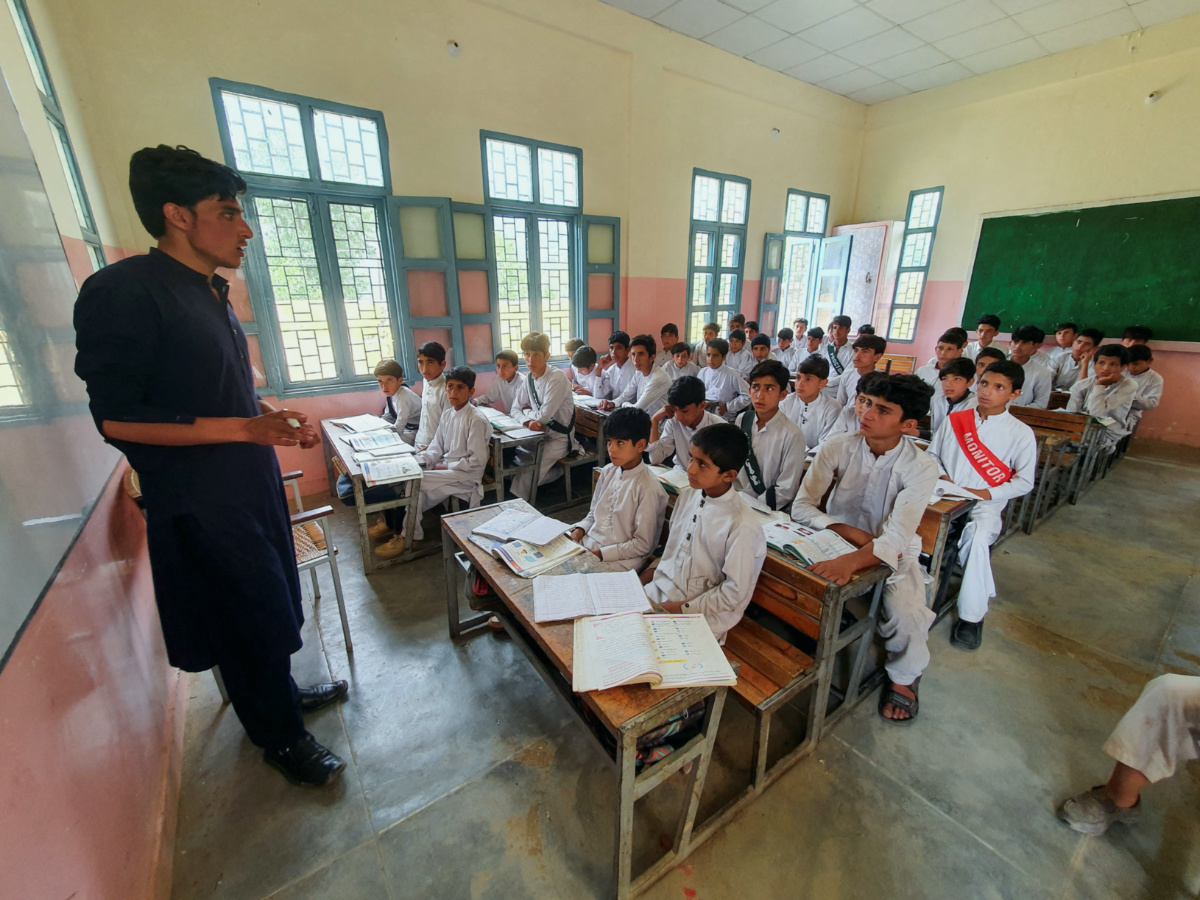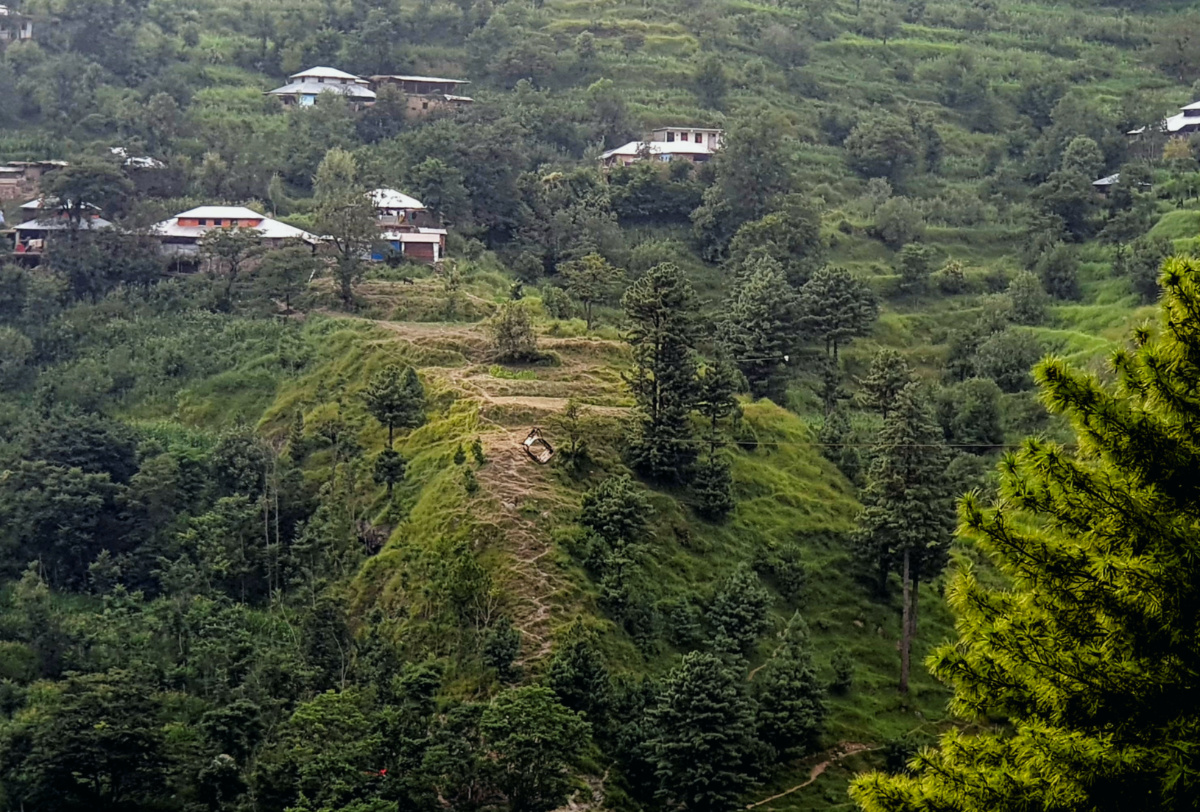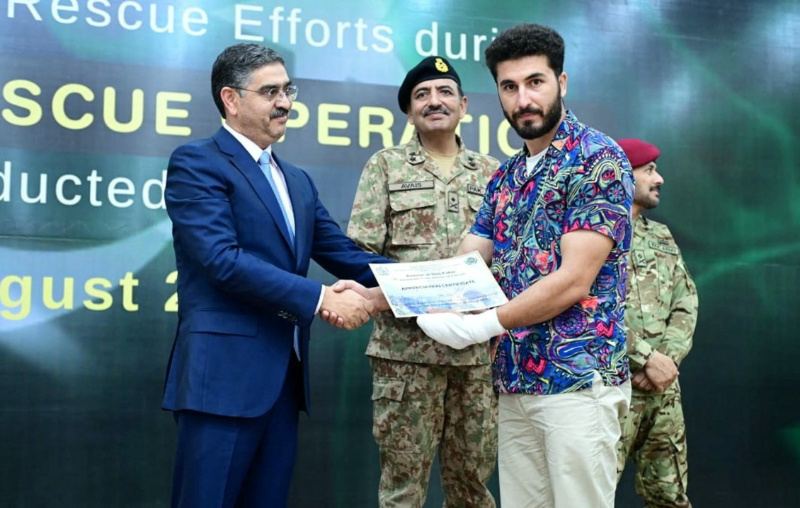
SALAH UDDIN and CHARLOTTE GREENFIELD, of Reuters, report…
Battagram, Pakistan
Reuters
Ibrar Ahmed is relieved to be alive after being stuck on a cable car high over a river in northern Pakistan for 16 hours this week, but now the student wonders how he will make the arduous trek to class each day.
“God willing, I am going to continue with my studies, but the way to our school is so long,” he said after Tuesday’s ordeal, which grabbed global attention.
“Sometimes…I get late for school because it opens at 8:30am and the road is so perilous,” said Ahmed, in his first year of high school at Batungi Pashto Government School. “The [chair]lift is necessary, but now we are terrified of it.”

Israr Ahmed, (right – second row) who survived after being rescued from a stranded cable car, sits with other children in a classroom at a school in Battagram, Pakistan, on 23rd August, 2023. PICTURE: Reuters/Salahuddin
Seven children and one man were rescued by Pakistan’s military and civilians from the flimsy cable car after a cable broke, dangling them 183 metres high in mountainous Battagram district north of Islamabad.
The harrowing ordeal highlights a crisis of school accessibility for many in Pakistan, with few high schools, poor roads, poverty and extreme weather hampering students’ ability to get to class.
“Most boys who come from far-off villages try their best to continue but they often face problems in travelling back and forth, either because they are too young or not strong enough or sick, so they definitely leave their studies.”
– Ali Asghar Khan, Batungi Pashto High School head teacher
That is a major reason Pakistan has the world’s second-lowest rate of school attendance. Some 23 million, or 44 per cent, of Pakistani children aged four to 16 are out of school and the situation is worse for girls, according to government figures and the World Bank.
Given Pakistan’s huge youth population, boosting education rates is vital for economic sustainability and to mitigate the security concerns that plague the South Asian country, exacerbated by the lure of militant groups in impoverished rural areas, analysts and economists say.
“Long distances and travel times, few transportation options and costs are some of the barriers to access education, particularly for girls who are often not allowed to travel long distances alone,” said Ellen Van Kalmthout, chief of education at UNICEF Pakistan.
Ahmed wants “a proper road” and a high school near his village.
Batungi Pashto High School head teacher Ali Asghar Khan links long commutes to high dropout rates.
“Most boys who come from far-off villages try their best to continue but they often face problems in travelling back and forth, either because they are too young or not strong enough or sick, so they definitely leave their studies,” Khan said.
“The ratio of dropouts is high here.”

A view of a suspended chairlift a day after rescuers pulled seven children and one man to safety when it became stranded high over a remote ravine, in Battagram, Pakistan, on 23rd August, 2023. PICTURE: Reuters/Salahuddin
Many students must walk one to three hours each way on poorly built trails, crossing streams that swell into dangerous rivers in rainy seasons, Khan said.
Those who make it are often exhausted by the journey, worsened by northern Pakistan’s hot summers and freezing winters. Tired and hungry, they struggle to concentrate, he said.
Communities have strung up scores of cable car systems through the mountainous Khyber Pakhtunkhwa province of steep hills plunging into valleys. They often cut commutes to 20 minutes for a cheap fare but come at a dangerous cost, even before Tuesday’s scare.
“Numerous accidents have occurred in the past,” said former provincial police inspector general Naeem Khan. “Mostly the local people themselves with some help from the local police rescue the stranded people.”
A civilian involved in Tuesday’s rescue said he had rescued people at least six times before on smaller chairlifts.
We rely on our readers to fund Sight's work - become a financial supporter today!
For more information, head to our Subscriber's page.
Some 50 chairlifts dot the hillsides of nearby Swat Valley. Residents said the cars provide a lifeline for students, especially after severe flooding last year damaged infrastructure, but there had been multiple deaths and injuries in the past year.
“Two months ago, a woman and her child fell into the River Swat…when the rope of the cable car broke. Their bodies are yet to be recovered,” said resident Nasrullah Khan.
Local officials and development agencies are struggling to fix the problems in the province, which are echoed throughout Pakistan.
“It is very difficult for them to reach schools in far-flung areas, but our government has in the last few years invested heavily and innovative ideas have been brought forward,” said Syed Hammad Haider, additional deputy commissioner of Battagram district.
Remote learning and community-based classes, particularly for girls, are a priority, while all the area’s cable cars are being checked and any with safety risks will be shut down, he said.
The World Bank is investing $US300 million in rural infrastructure for the province in a project through 2027, with access to education in mind.
Challenges include the shortage of middle and high schools, especially for girls, and the lack of good all-weather roads, “which are becoming increasingly vulnerable to natural disasters due to climate change”, a World Bank spokesperson said.
For students in areas like Battagram who risk their lives to go to school, that cannot come fast enough.
“We will now not go by lift, but I don’t want to leave school either,” said Rizwan Ullah, another rescued student. “We want roads in our region, we want a bridge, we want high schools, we want all these facilities. This is our demand.”
– With reporting by MUSHTAQ ALI

Pakistan’s caretaker Prime Minister Anwaar-ul-Haq Kakar awards appreciation certificate to rescuer Mohammad Ali, zipline rescuer of Battagram chairlift incident, during a ceremony at Prime Minister House in Islamabad, Pakistan, on 24th August, 2023. PICTURE: Press Information Department/Handout via Reuters
PAKISTAN RESCUERS FEARED THE WORST AS THEY RACED TO SAVE CHILDREN IN CABLE CAR
A nail-biting rescue of children dangling hundreds of metres in the air in a cable car in Pakistan this week faced unprecedented challenges, with officials fearing the last remaining cable could snap at any moment, rescuers and military officers said.
The 16-hour rescue effort gripped global attention, as Pakistan’s air force, military and civilians on the ground struggled to rescue eight people, mostly children, from the flimsy cable car, which was dangling 183 metres over a river below after one of its cables broke.
“It was very stressful,” said Major Asad Khan Marwat, who played a key role coordinating the operation from the ground.
An air force helicopter tried to approach the cable car for hours, but with strong, gusty winds it was difficult to get close.
Asad said rescuers were worried that dropping a rescuer onto the cable car, which was only built for seven or eight people, could cause it to fall. But they struggled to try to convince the terrified children to clip themselves into harnesses and step off the car so they could be winched up by helicopter. Eventually, one child tried just before nightfall.
“That kid was able to wear that harness and he hooked himself up,” said Asad. “He was a brave kid.”
As light faded, winds picked up. Worried that any further attempts by air would be too dangerous, rescuers called the helicopters off. Fearing that the last cable would snap and with the children getting hungry – two fainted during the ordeal – they decided the rescue would have to continue from the ground.
“We had to do it at any cost,” said Lieutenant Colonel Muhammad Kamran, who helped oversee the operation with the Special Service Group, the special forces unit.
One local resident, Habibullah, 23, told Reuters he had done around six rescues along cable car lines before, albeit much smaller ones. He convinced the military he should travel out along the cable as a trial run. He strung up a simple charpai – a wood and string cot – and tied it to the remaining cable. He pulled himself out towards the cable car but was unable to get close enough.
Still, military officers were now convinced it could work with the right equipment.
A resident on the other side of the valley, Sahib Khan, 24, who had been provided a harness by rescuers, set out from the right side of the river bank – opposite from the main rescue operations – and managed to bring back one person.
Asad and local residents tried to encourage the remaining children via phone.
“We consoled them on the phone. I said: ‘you just wear the harness, you are safe, you will go nowhere’.”
Two professional zip-liners who run an adventure company were brought to the area and then rescued three children in one go. Carefully securing the children into harnesses, Mohammad Ali said he then double checked the clips.
“Kids, where we are securing you, please don’t fiddle with it,” he told them before soaring back across the valley with the three in tow.
After Ali fractured his hand, a special forces commando took his place on the next and final zip-line trip.
They delivered the final three to the hillside, hovering in harnesses, where their families waited, to cries of ‘God is Great’.
“It was a moment of great achievement,” said Lieutenant Colonel Kamran. “The locals were very happy, very thankful to Allah Almighty…we were thankful to them for their support…They had their dear ones with them, they had their mothers, they held them and greeted them.”
Meeting later in the capital Islamabad on Thursday, rescuers, residents and students gathered, first attending a celebration ceremony with the caretaker Prime Minister and later speaking together over tea and samosas as they bonded over the high-stakes rescue.
“I spoke with them [the rescued children] and it felt they were just like my family members, my own kids, my own brothers, I was very happy to see them,” Kamran said.
– CHARLOTTE GREENFIELD, Islamabad, Pakistan/Reuters






